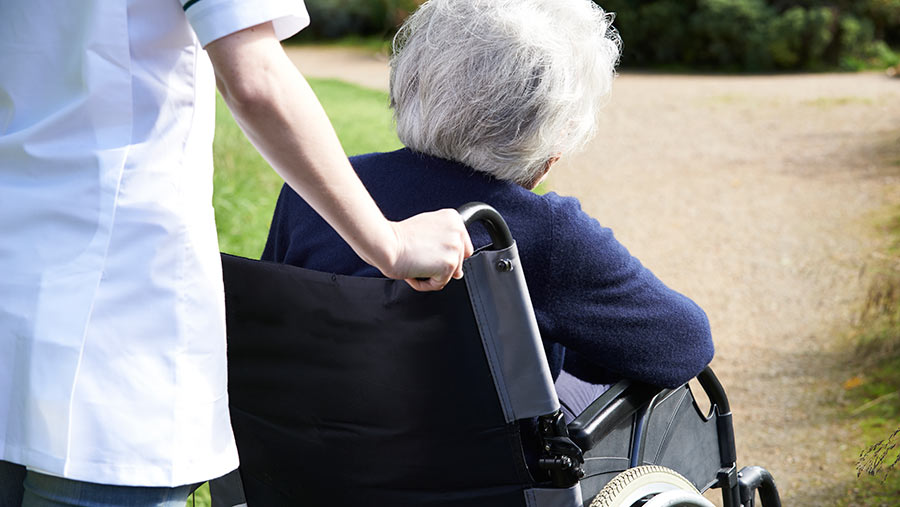Business Clinic: How will we fund care home fees without damaging farm?
 © Ingram Image
© Ingram Image Whether it’s a legal, tax, insurance, management or land issue, Farmers Weekly’s experts can help. Here, Mike Westbrook, partner, and Jack Rogers, solicitor, from Thrings offer advice on how entitlement to help with care home fees might be assessed.
Q. My husband and his mother are in a farm business partnership in Northern Ireland. He is 58 and she is 87.
He farms the land, which his mother still owns. He has invested in the business financially and, of course, with his time and expertise.
His mother has Alzheimer’s disease and my husband has power of attorney, as she no longer has capacity.
My husband is the beneficiary of the land and property when his mother dies. The spectre of care homes and funding of the same is now raising its head and my husband is worried sick that his life’s work will amount to nothing.
I would appreciate any help or advice. Any information we have read concerns people’s assets in the form of property and savings but we can find nothing about farm businesses.
A. Under the Care Act 2014, the local authority is under a duty to assess the care an individual requires and also to assess their financial resources for funding their care. They will then make a decision as to what that capital contribution towards their care should be.
Some assets can be classified as disregarded capital in the local authority assessment. This means the asset will not be included in the assessment when calculating how the care should be paid for.
Unfortunately a share in a farming partnership is not classified as disregarded capital and would be brought into account in the local authority assessment.
On the facts presented, the share in the farming partnership would therefore be included in your mother-in-law’s case.
However, the Charging for Residential Accommodation Guide (CRAG) published by the Department of Health and Social Care offers useful guidance as to how business assets should be treated by the local authority in their assessment.
The guide states that while the share in the partnership (which is a business asset) does not fall into the category of disregarded capital, it can be disregarded capital for a “reasonable” period of time.
This is on the basis that your mother-in-law should be allowed a reasonable period in which to sell or otherwise realise the partnership share.
The guide further states that your mother-in-law would not necessarily have to have taken steps to realise the partnership share at the point of assessment but would have to show a clear intention to do so as soon as practical.
It is therefore important to understand whether a formal partnership agreement is in place between your husband and your mother-in-law.
This will help establish the value of her interest in the partnership agreement and what value might be assessed – and ultimately that might qualify to be disregarded for a reasonable period of time.
On the facts presented, it would appear that the share in the farming partnership would be very difficult to sell on the open market.
The reality is that only your husband, as the other partner, is likely to want to purchase the share.
Therefore, while the value of the interest will be assessed by the local authority for funding care, it could potentially be disregarded for a period of time.
If your husband is unable to raise the funds to purchase the share of the farming partnership, the local authority may take this into account when allowing the temporary disregard.
It is sometimes tempting to make efforts to mitigate an individual’s financial contribution towards their care fees by gifting away assets.
If an individual has given away assets in circumstances where the local authority could reasonably conclude that they did so to reduce the assets they own that would be subject to assessment, the local authority can invoke the “deprivation of assets” rules.
This would effectively set the gift aside for assessment purposes.
As your mother-in-law has lost capacity, she is unable to make significant gifts herself (which includes a transfer of her partnership capital).
I understand your husband holds a power of attorney.
This confers only a very limited authority to make gifts on behalf of his mother, such as small gifts on birthdays and at Christmas and to continue charitable donations that she was already in the habit of making.
It would not give authority to make significant transfers of partnership capital and any proposed transfers would require approval from the Court of Protection.
Do you have a question for the panel?
Outline your legal, tax, finance, insurance or farm management question in no more than 350 words and Farmers Weekly will put it to a member of the panel. Please give as much information as possible.
Send your enquiry to Business Clinic, Farmers Weekly, RBI, Quadrant House, The Quadrant, Sutton, Surrey SM2 5AS.
You can also email your question to fwbusinessclinic@rbi.co.uk.

